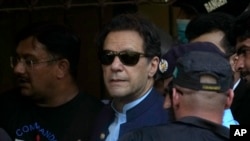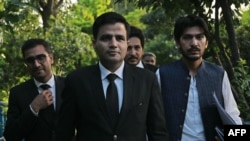Pakistan's election commission ruled Tuesday that former Prime Minister Imran Khan cannot hold any public office for five years after being convicted and jailed on corruption charges.
The commission announced the disqualification hours after Khan appealed his conviction in a high court in Islamabad. A hearing is scheduled for Wednesday.
Police arrested the 70-year-old opposition leader on Saturday, minutes after a federal court convicted him of "corrupt practices" and sentenced him to three years for allegedly concealing earnings from the sale of state gifts he acquired while in power from 2018 to 2022.
Tuesday's order by the Election Commission of Pakistan cited the court verdict and relevant electoral laws for declaring Khan ineligible to hold public office.
"Therefore, Mr. Imran Ahmad Khan Niazi is disqualified for a period of five years," it said.
Polls show the cricket-star-turned-political-leader is the most popular national politician heading the country's largest party — Pakistan Tehreek-e-Insaf, or PTI.
Khan maintains that he did not violate any law and accuses the powerful military and incumbent Prime Minister Shehbaz Sharif of being behind the "politically motivated" graft charges to keep him from contesting elections slated for later this year.
Sharif and the military deny the charges.
Saturday's court verdict was announced in the absence of Khan and his lawyers, prompting legal experts to question its legality and the haste with which it was carried out.
A central PTI leader denounced "the premature decision" by the election commission, saying it is yet another government attempt to eliminate Khan from Pakistan's political landscape.
"We're very confident the [graft] case against Imran Khan will be reversed in the high court, if not in the Supreme Court," Zulfikar Bukhari told VOA.
Since Khan was forced out of power by a parliamentary no-confidence vote in April 2022, Bukhari said, Pakistani authorities have instituted what he called about 200 frivolous and politically motivated cases against Khan, from terrorism and corruption to murder charges.
The former prime minister was taken into custody from his home in the eastern city of Lahore on Saturday before being transferred to a high-security British-colonial-era prison about 70 kilometers west of the Pakistani capital.
On Monday, PTI leaders and lawyers protested that Khan was held in a cramped, dirty, and insect-filled cell at the notorious prison meant for suspected terrorists and hard-core criminals. They said the former Pakistani leader "is deprived of the rights and facilities to which he is otherwise entitled" under the country's prison rules.
Government officials have refused to comment on the alleged mistreatment of the former Pakistani leader.
Khan's conviction and subsequent disqualification came a day before Sharif was due to dissolve the government and the legislative National Assembly, the lower house of parliament. Wednesday's expected move will pave the way for a caretaker administration to take charge and oversee new elections in Pakistan within 90 days in line with the constitution.
The jailed PTI chief has consistently accused the military of orchestrating his ouster from office and the subsequent legal challenges facing him.
The military has ruled Pakistan for nearly half its 75-year history by staging coups against elected governments. Critics say Pakistani generals have meddled in political affairs even when they are not in power and orchestrated the toppling of prime ministers because they had fallen out with the military.
Khan was arrested in May in a separate case, but the Supreme Court outlawed the move two days later and ordered his release. His brief arrest, however, triggered nationwide violent protests by PTI supporters, with some storming military installations.
An army-backed government crackdown has since arrested thousands of Khan party leaders and workers, including women. More than 100 detainees face trial in military courts for their alleged roles in ransacking defense infrastructure.
The ousted prime minister blames intelligence agency operatives for "infiltrating" protests and attacking army buildings to pave the way for the crackdown on PTI leaders and workers. Pakistani officials reject those charges.





